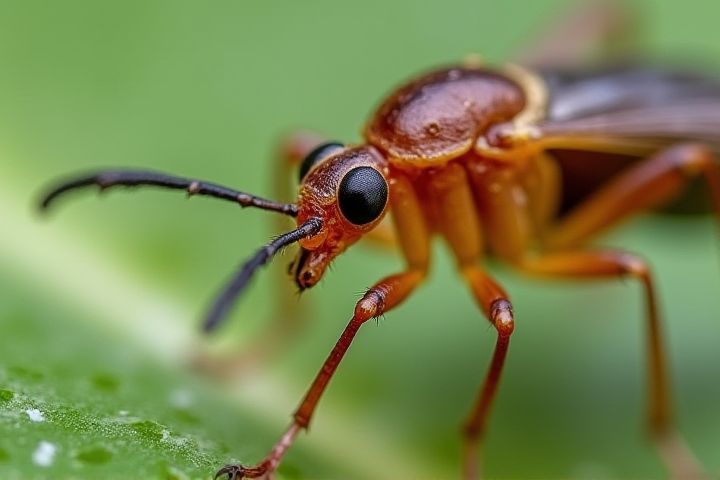
To effectively deal with house pests, identify the specific type of pest--common ones include ants, roaches, and rodents. You can then choose appropriate control methods, such as traps, baits, or natural repellents like diatomaceous earth for crawling insects. Maintaining cleanliness by regularly vacuuming, sealing food containers, and removing standing water will help deter infestations. You may also want to inspect your home for entry points, sealing cracks and gaps to prevent pest access. If infestations persist or worsen, consider contacting a professional pest control service for comprehensive treatment options.
How To Deal With House Pests
Identify the pest type
Identifying the pest type is crucial for effective pest control, as each species exhibits distinct behaviors and habitats. Common household pests include ants, cockroaches, rodents, and termites, each requiring specific methods for eradication. For instance, ants often leave pheromone trails, while cockroaches are typically found in dark, moist areas. Using tools such as sticky traps or pest identification apps can help you pinpoint the exact species infesting your home, allowing for targeted treatment strategies.
Maintain cleanliness
Maintaining cleanliness is crucial in pest control, as dirty environments attract unwanted insects and rodents. Regularly vacuuming carpets and sweeping floors can eliminate food particles, while promptly cleaning spills prevents pests from being drawn to your living space. Storing food in airtight containers and disposing of garbage daily significantly reduces potential food sources for pests. By keeping your home clean and organized, you create an uninviting atmosphere for pests, ultimately minimizing their presence.
Seal entry points
Seal entry points by inspecting your home for gaps and cracks, particularly around windows, doors, and foundations. Using caulk or spray foam insulation can effectively block these openings, preventing pests like rodents and insects from entering. Consider installing door sweeps and window screens to further reduce access points. Regular maintenance and inspection should be part of your ongoing pest control strategy to keep your living space pest-free.
Use traps and baits
To effectively deal with house pests, utilizing traps and baits is crucial. Choose specific traps designed for the targeted pest; for example, sticky traps for insects like roaches or snap traps for rodents. Place baits made of food substances or poison in strategic locations, ensuring they are out of reach of pets and children. Regularly inspect traps and baits, replacing or replenishing them as needed to maintain an effective pest control strategy.
Employ natural remedies
Employing natural remedies to deal with house pests can be both effective and environmentally friendly. For example, diatomaceous earth, a powder made from fossilized algae, can be sprinkled in areas where pests congregate, effectively desiccating insects like cockroaches and ants. Essential oils, such as peppermint and tea tree oil, can also act as natural repellents; simply mixing a few drops with water in a spray bottle allows you to deter pests without harmful chemicals. Lastly, introducing beneficial insects like ladybugs and lacewings can naturally reduce populations of harmful pests in your home.
Utilize chemical solutions cautiously
Utilizing chemical solutions to manage house pests requires careful consideration and adherence to safety guidelines. Always read labels for specific instructions, including recommended dosages, application methods, and safety precautions. Prioritize environmentally friendly products that minimize harm to pets and children while effectively targeting pests. You should also implement integrated pest management strategies to complement chemical treatments, ensuring a comprehensive approach to pest control.
Regular monitoring
Regular monitoring is essential for effective pest management in your home. Inspect areas like kitchens, basements, and attics at least once a month for signs of infestation, such as droppings or damage to food. Setting up pest traps can help you track pest activity; ideally, place them in high-traffic areas noted during inspections. By maintaining a consistent monitoring schedule, you empower yourself to catch infestations early, which can save you from costly extermination services later on.
Hire professional pest control
Hiring professional pest control services can significantly enhance your home's defense against pests. Certified technicians employ specialized knowledge and advanced methods, often utilizing Integrated Pest Management (IPM) strategies to effectively target and eliminate infestations. Many companies offer 24/7 emergency services and pest prevention plans that can reduce the likelihood of future outbreaks, typically after conducting thorough inspections and providing you with tailored solutions. Investing in professional pest control not only safeguards your home but also promotes a healthier living environment for you and your family.
Ensure waste management
Effective waste management plays a crucial role in controlling house pests. Properly sealing trash cans can significantly reduce food access for nuisance insects and rodents, preventing infestations. Regularly cleaning and emptying compost bins will minimize odors and deter pest attraction, while also managing organic waste effectively. Implementing a systematic waste disposal schedule, at least twice a week, can further enhance your pest prevention efforts and create a healthier living environment.
Educate household members
Educating household members about pest identification plays a crucial role in effective pest management. You can establish a regular schedule for discussions or workshops to inform everyone about common house pests, such as ants, cockroaches, and rodents, along with their distinct behaviors and signs of infestation. Using visual aids and hands-on demonstrations can enhance understanding, leading to quicker recognition of infestations. Empowering your family with knowledge helps foster proactive measures, reducing the likelihood of serious pest problems.
